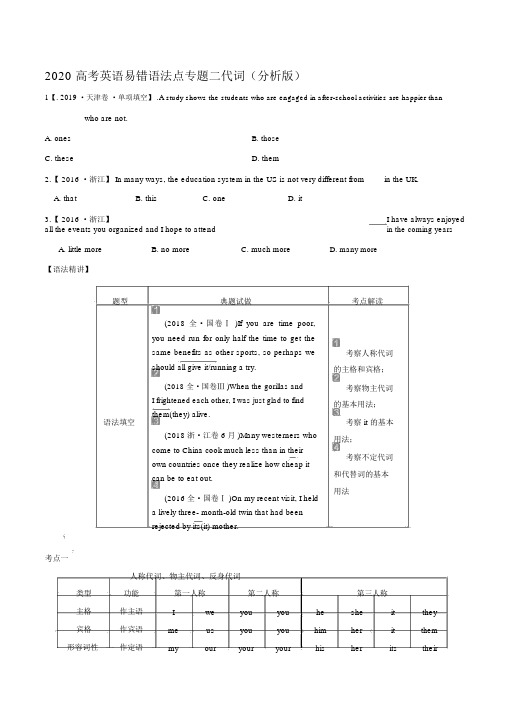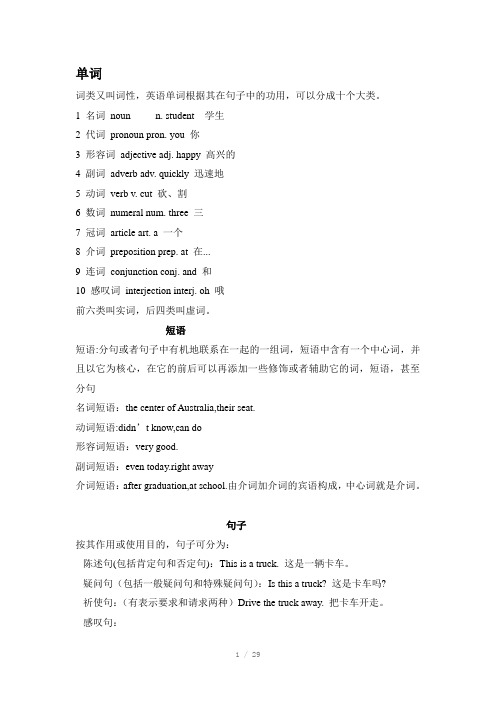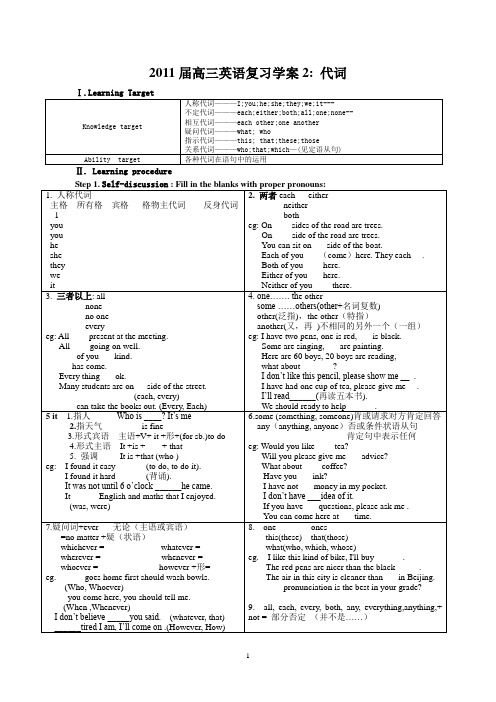2代词
- 格式:doc
- 大小:68.00 KB
- 文档页数:6

2020 高考英语易错语法点专题二代词(分析版)1【. 2019 ·天津卷·单项填空】 .A study shows the students who are engaged in after-school activities are happier than_________who are not.A. onesB. thoseC. theseD. them2.【 2016 ·浙江】 In many ways, the education system in the US is not very different from ____in the UK.A. thatB. thisC. oneD. it3.【 2016 ·浙江】I have always enjoyed all the events you organized and I hope to attend in the coming yearsA. little moreB. no moreC. much moreD. many more【语法精讲】题型典题试做(2018 全·国卷Ⅰ)If you are time poor,you need run for only half the time to get thesame benefits as other sports, so perhaps weshould all give it/running a try.(2018 全·国卷Ⅲ )When the gorillas andI frightened each other, I was just glad to findthem(they) alive.语法填空(2018 浙·江卷 6 月 )Many westerners whocome to China cook much less than in theirown countries once they realize how cheap itcan be to eat out.(2016 全·国卷Ⅰ )On my recent visit, I helda lively three- month-old twin that had beenrejected by its(it) mother.考点一考点解读考察人称代词的主格和宾格;考察物主代词的基本用法;考察 it 的基本用法;考察不定代词和代替词的基本用法人称代词、物主代词、反身代词类型功能第一人称第二人称第三人称主格作主语I we you you he she it they 宾格作宾语me us you you him her it them 形容词性作定语my our your your his her its their物主代词名词性作主、表mineours yours yours his hers its theirs 物主代词或宾语反身代词作宾、表our-your-your-him-her-it-them-myselfself selves self self self selves 或同位语selves1.人称代词指代的数目前后要一致。

单词词类又叫词性,英语单词根据其在句子中的功用,可以分成十个大类。
1 名词noun n. student 学生2 代词pronoun pron. you 你3 形容词adjective adj. happy 高兴的4 副词adverb adv. quickly 迅速地5 动词verb v. cut 砍、割6 数词numeral num. three 三7 冠词article art. a 一个8 介词preposition prep. at 在...9 连词conjunction conj. and 和10 感叹词interjection interj. oh 哦前六类叫实词,后四类叫虚词。
短语短语:分句或者句子中有机地联系在一起的一组词,短语中含有一个中心词,并且以它为核心,在它的前后可以再添加一些修饰或者辅助它的词,短语,甚至分句名词短语:the center of Australia,their seat.动词短语:didn’t know,can do形容词短语:very good.副词短语:even today.right away介词短语:after graduation,at school.由介词加介词的宾语构成,中心词就是介词。
句子按其作用或使用目的,句子可分为:陈述句(包括肯定句和否定句):This is a truck. 这是一辆卡车。
疑问句(包括一般疑问句和特殊疑问句):Is this a truck? 这是卡车吗?祈使句:(有表示要求和请求两种)Drive the truck away. 把卡车开走。
感叹句:(有what 或者how 引导)What a big truck it is! 多么大的卡车! 句式结构分为五大类:1 主+系动词+表语+(表语补足语)常用的连系动词:表语是表明主语身份或状态①变成,变得:become, come, fall, get, go, grow, run, turn②保持某种状态:Continue, keep, lie, remain, stand, stay.③看起来,好像:Appear, look, seem.④感官动词:Feel, smell, sound, taste.He is older than he looks.他比看上去要老。



2011届高三英语复习学案2: 代词Step 3 Self-development Fill in the blanks with a proper pronoun:1.We’ve planted a lot of apple trees, but because there has been no rain, _____ have borne fruits.2.Can you leave your children at home alone? Y es, they can take care of ______.3.I asked him for some oil, but he hadn’t______.4.Are the two answers correct? No, _______ is correct.5.I feel a bit hungry. Why don’t you have _____ bread?6.Is______ necessary to tell his father everything?7.As we were asleep, ______of us heard the sound.8.Shall I sit at this end of the boat or the other end? If you keep still, you can sit at _______end.9.________leaves the room last ought to turn off the light.10._______writer is better known in China, Charle Dickens or Mark Twain?11.We couldn’t eat in a restaurant because _____of us had _____money on us.12.I invited Tom and Ann to dinner, but _____of them came.13.There are so many kinds of tape-recorders on sale that I can’t make up my mind _____to buy.14.Although he is wealthy, he spends _____on clothes.15.Would you like some wine? Y es, just a ______.16.Have you finished your report yet?No, I’ll finish it in ______ten minutes.17.They were all tired, but _______of them would stop to take a rest.18.There are many trees on _______side of the street.19.The students are standing on _____sides of the playground.20.This article is easy to understand though there are a ____new words in it.Step 4 Self-appreciationEvery sentence has a mistake, please find them out and correct them.1. Nobody of them understood the old foreigner.2.Whose room is that? It’s my3. This year they have produced fewer grain than they did last year.4. Tom felt that he knew everybody’s business better than they knew it it self..5. I don’t think I can introduce you to the other guests, because I know a few of them.6. “Wonderful,mother!”he said, holding her hands in hers.7. Neither she nor me liked the idea of going on foot.8. The twins are very much alike. I can’t tell one from the another9. Both of his sisters is good at dancing.10. Bill is cleverer than anyone in his class.Step 5 Self-digest : Fill in the blanks with proper words.Bennet Cerf tells this touching story about a bus 1 was bumping (颠簸而行) along a back road in the South.In one seat an old man sat holding a bunch of fresh flowers. Across the aisle (过道) 2 (sit) a young girl whose eyes came back again and again 3 the man’s flowers. The time came 4 the old man to get off. Without much thinking, 5 thrust the flowers into6 love the would like7 to have them. I’ll tell her I gave __ _8 to you.” The girl accepted the flowers, 910. off the bus and walk through the gate of a small cemetery ().(2)When I was growing up I do not recall hearing the words “I love you” from my father. When your father never says ___11___ to you when you are a child, it gets tougher and tougher for him ___12___ (say) those words as he gets ___13___ (old). To tell the truth, I could not honestly remember ___14___ I had last said those words to him either. I decided to set my ego (自我) aside and make the first move. ___15___ some hesitation, in our next phone conversation I blurted out (突然说出) theThere was a silence at the ___16___ end and he ___17___ (awkward) replied, “Well, same back at you!”I laughed and said, “Dad, I know you love me, and when you are ready, I know you___18___ (say) what you want to say.”A few weeks later, Dad concluded our phone conversation ___19___ the words, “Paul, I love you.” I was at work during this conversation and the tears were rolling down my cheeks ___20___ I finally “heard” the love. As we both sat there in tears we realized that this special moment had taken our father-son relationship to a new level.参考答案2011届高三英语复习学案2: 代词9.Whoever 10. Which 11. none; any 12. neither 13.which 14. little 15. little 16. another17. none 18. either 19.all 20. fewStep 4 Self- appreciation: 1. Nobody-None 2. my-mine 3. fewer-less 4. itself-themselves5. a few-few6. hers-his7. me-I8. another-other9. Both-nether / is-are 10.anyone 后加else Step 5 Self- digest1. that/which2. sat3. to4. for5. he6. you7. you8. them9. and 10. get11. them 12. to say 13. older 14. when 15. After 16. other 17. awkwardly 18. will say 19. with 20 as / because。

初中英语语法公式口诀初中英语语法公式口诀导语:很多人都认为英语很难学习,特别是英语的语法,没有规律,其实英语也有很多口诀,窍门。
下面由店铺为您整理出的初中英语语法公式口诀内容,一起来看看吧。
初中英语语法公式口诀1一、冠词基本用法【速记口诀】名词是秃子,常要戴帽子,可数名词单,须用a或an,辅音前用a, an在元音前,若为特指时,则须用定冠,复数不可数,泛指the不见,碰到代词时,冠词均不现。
【妙语诠释】冠词是中考必考的语法知识之一,也是中考考查的主要对象。
以上口诀包括的意思有:①名词在一般情况下不单用,常常要和冠词连用;②表示不确指的可数名词单数前要用不定冠词a或an,确指时要用定冠词the;③如复数名词表示泛指,名词前有this,these,my,some等时就不用冠词。
二、名词单数变复数规则【速记口诀】单数变复数,规则要记住,一般加s,特殊有几处:/s/结尾,es不离后,末尾字母o,大多加s,两人有两菜,es不离口,词尾f、fe,s前有v和e;没有规则词,必须单独记。
【妙语诠释】①大部分单数可数名词变为复数要加s,但如果单词以/t/、/s/发音结尾(也就是单词如果以ch,sh,s,x等结尾),则一般加es;②以o结尾的单词除了两人(negro,hero)两菜(tomato,potato)加es外,其余一般加s;③以f或fe结尾的单词一般是把f,fe 变为ve再加s;④英语中还有些单词没有规则,需要特殊记忆,如child—children,mouse—mice,deer—deer,sheep—sheep,Chinese—Chinese,ox—oxen,man—men,woman—women,foot—feet,tooth—teeth。
三、名词所有格用法【速记口诀】名词所有格,表物是“谁的”,若为生命词,加“’s”即可行,词尾有s,仅把逗号择;并列名词后,各自和共有,前者分别加,后者最后加;若为无生命词,of所有格,前后须倒置,此是硬规则。
语文中什么是代词有哪些分类代词是我们在日常交流中经常用到的一类词,它们在交际中有很重要的作用。
下面是店铺整理的语文中什么是代词,欢迎阅读。
语文中什么是代词代词能代替实词和短语。
表示指称时,有定指和不定指的区别。
不定指往往是指不确定的人、物或某种形状、数量、程度、动作等。
他不常指某一定的人物,也就不可能有一定意义,介乎虚实之间。
代词是众多词性里或不可缺的一部分代词分类表代替名词、动词、形容词、数量词的词。
如:我、他们、自己、人家、谁、怎样、多少、那里、这儿等。
代词通常会显示出人称和数的区别:一般区分第一、第二和第三人称,以及单复数等。
也有很多语言的代词会显示格的区别(如英语中第一人称复数主格“we”和宾格“us”),性的区别(如法语中的阳性“il”和阴性“elle”)或是否是生物的区别(如正体中文中的“它”和“他”)。
同一语言内随方言不同代词也有很多变化有一些语言的第一人称代词区分“涵盖词”和“排外词”,如北京口语中,如果和特定对方交谈时(不是泛指),包括听者一般会用“咱们”,不包括听者用“我们”。
但“我们”有的时候也可以泛指包括听者,这种情况在其他地区更明显,很多会一概用“我们”代替(有的方言中没有“咱们”这个词);很多地方这两个词的意思还会正好相反。
代词分类可分为三类:(1)人称代词,如:我、他们、汝、吾辈;(2)疑问代词,如:谁、怎么;(3)指示代词,如:这、那里、此、如此。
1、人称代词:代替人或事物的名称。
如“我、你、您、他、她、它、我们、你们、他们、她们、它们、咱们、自己、别人、大家、大伙(自己能和其他代词连用,起强调作用。
例如:我自己、你们自己、大家自己)”。
2、疑问代词:用来提出问题。
如“谁、什么、哪(问人或事物)、哪儿、那里(问处所)、几多 (问数量)、多、多么 (问程度)、怎么、怎样、怎么样 (问性质状态)、什么、怎样什么样(问方式行动)”。
3、指示代词:用来区别人或事物。
如“这、那(指人或事物)、这儿、这里、那儿、那里(指处所)、这会儿、那会儿(指时间)、这么、这样、这么样、那么、那样、那么样(指性质、状态、方式、行动、程度)、这些、那些、这么些、那么些(指数量)、每、各(指所有的或全体中任何一个)、某、另、别(确有所指,未说明哪一个)”。
英语单词词性的十大分类一、词性的分类词类又叫词性,英语单词根据其在句子中的功用,主要分为十个大类。
下面分别说明和列举。
1 名词noun n. book 书2 代词pronoun pron. he/she/it 他/她/它3 形容词adjective adj. good 好的4 副词adverb adv. quickly 迅速地5 动词verb v. go 去6 数词numeral num. One/two/three... 一/二/三......7 冠词article art. a 一个8 介词preposition prep. at 在...9 连词conjunction conj. and 和10 感叹词interjection interj. oh 哦前六类叫实词,后四类叫虚词。
二、名词名词概论名词可以分为专有名词(Proper Nouns)和普通名词(Common Nouns),专有名词是某个(些)人,地方,机构等专有的名称,如Beijing,China等。
普通名词是一类人或东西或是一个抽象概念的名词,如:book,sadness等。
·专有名词:某个(些)人,地方,机构等专有的名称,如Beijing,China等。
·普通名词:一类人或东西或是一个抽象概念的名词,如:book,sadness等。
·个体名词:表示单个的人和事物。
horse 、car、room、apple、fan、picture。
·集体名词:表示一群人或一些事物的名称。
People、family、army、government、group。
·物质名词:表示物质或不具备确定形状和大小的个体的物质。
Fire、steel、air、water、milk。
·抽象名词:表示动作,状态,品质或其他抽象概念。
Labour、health、life、friendship、patience。
英语词性的分类及用法一、词性的分类词类又叫词性,英语单词根据其在句子中的功用,可以分成十个大类。
1 名词noun n. student 学生2 代词pronoun pron. you 你3 形容词adjective adj. happy 高兴的4 副词adverb adv. quickly 迅速地5 动词verb v. cut 砍、割6 数词numeral num. three 三7 冠词article art. a 一个8 介词preposition prep. at 在...9 连词conjunction conj. and 和10 感叹词interjection interj. oh 哦前六类叫实词,后四类叫虚词。
二、名词名词概论名词复数的规则变化名词的格在英语中有些名词可以加"'s"来表示所有关系,带这种词尾的名词形式称为该名词的所有格,如:a teacher's book。
名词所有格的规则如下:1)单数名词词尾加"'s",复数名词词尾没有s,也要加"'s",如the boy's bag 男孩的书包,men's room 男厕所。
2)若名词已有复数词尾-s ,只加"'",如:the workers' struggle工人的斗争。
3)凡不能加"'s"的名词,都可以用"名词+of +名词"的结构来表示所有关系,如:the title of the song 歌的名字。
4)在表示店铺或教堂的名字或某人的家时,名词所有格的后面常常不出现它所修饰的名词,如:the barber's 理发店。
5)如果两个名词并列,并且分别有's,则表示"分别有";只有一个's,则表示'共有'。
专题02代词、介词和介词短语年份卷别代词(2022-2024)三年(6考)介词和介词短语(2022-2024)三年(12考)命题趋势2024新高考I 卷as 代词:研究最近几年高考真题可知,对代词的考查主要集中在:1.考查代词词形转换及代词的句法功能。
无词填空中对it 的特殊用法也是高考的热点。
介词:高考对介词的考查集中在:1.介词的基本用法和含义。
2.介词短语介词与其他词类的搭配。
新高考II 卷to (be similar to)浙江卷1月ones 全国甲卷its for 2023新高考I 卷their by 新高考II 卷with 全国甲卷we 改为us for 全国乙卷his →her to 浙江卷1月as 2022新高考I 卷as新高考II 卷全国甲卷we 改为us 删除of 全国乙卷by浙江卷1月浙江卷6月at 北京卷themselves in考点01代词1.(2024年浙江卷1月·语法填空)Who knows,perhaps some of the more forward-looking ________(one)mayyet come out with a whole range of“just for you”pack sizes with special offers as well.【答案】ones【解析】考查代词。
句意:谁知道呢,也许一些更有远见的人可能还会推出一系列“只为你”的包装尺寸,并提供特别优惠。
代词one意为“一个人”,在some of后应用复数形式。
故填ones。
2.(2024年全国甲卷语法填空)This area,with_______(it)unique and breathtaking natural beauty,must be well preserved for all people of the nation to enjoy-as a national park.【答案】its【解析】考查代词。
专题二代词代词是代替名词的一种词类。
大多数代词具有名词和形容词的功能。
英语中的代词,按其意义、特征及在句中的作用分为:人称代词、物主代词、指示代词、自身代词、相互代词、疑问代词、关系代词和不定代词八种。
一、人称代词是表示"我"、"你"、"他"、"她"、"它"、"我们"、"你们"、"他们"的词。
人称代词有人称、数和格的变化,见下表:数单数复数格主格宾格主格宾格第一人称I me we us第二人称you you you youhe him they them第三人称she her they themit it they them二、物主代词表示所有关系的代词,也可叫做代词所有格。
物主代词分形容性物主代词和名词性物主代词二种,其人物和数的变化见下表。
数单数复数人称第一第二第三第一第二第三形容词性物主代词my your his/her / its our your their名词性物主代词mine yours his/hers its ours yours theirs三、指示代词表示"那个"、"这个"、"这些"、"那些"等指示概念的代词。
指示代词有this,that,these,those等。
四、表示"我自己"、"你自己"、"他自己"、"我们自己"、"你们自己"和"他们自己"等的代词,叫做自身代词,也称为"反身代词"。
I you she he it onemyself yourself herself himself itself oneselfwe you theyourselves yourselves themselves五、表示相互关系的代词叫相互代词,有each other 和one another两组.六不指明代替任何特定名词的代词叫做不定代词:something, anything, everything, nothing.七、疑问代词有who,whom,whose,what和which等。
在句子中用来构成特殊疑问句。
疑问代词都可用作连接代词,引导名词性从句(主语从句、宾语从句和表语从句)八、关系代词有who,whom,whose,that,which,as等,可用作引导从句的关联词。
它们在定语从句中可作主语、表语、宾语、定语等;另一方面它们又代表主句中为定语从句所修饰的那个名词或代词(通称为先行词)。
1. 代词的指代问题1)不定代词anybody,everybody,nobody,anyone,someone,everyone,no one,及whoever和person在正式场合使用时,可用he, his, him代替。
2)动物名词的指代一般用it或they代替,有时也用he, she,带有亲切的感情色彩。
3)指代车或国家,船舶的名词,含感情色彩时常用she。
2. 并列人称代词的排列顺序1) 单数人称代词并列作主语时,其顺序为:第二人称-> 第三人称-> 第一人称you -> he/she;it -> I2) 复数人称代词作主语时,其顺序为:第一人称-> 第二人称-> 第三人称we->you->They 注意:在下列情况中,第一人称放在前面。
a. 在承认错误,承担责任时,It was I and John that made her angry.b. 在长辈对晚辈,长官对下属说话时,如长官为第一人称,如I and you try to finish it.c. 并列主语只有第一人称和第三人称时d. 当其他人称代词或名词被定语从句修饰时。
3. 不定代词的用法可数one, each, many, both, another, either, neither, (a) few 不可数much, (a) little可数不可数none, any, other, all, some复合不定代词anyone, anybody, anything; someone, somebody, something; everyone, everybody, everything; nobody, nothing1.1 none, no one, nothing 的用法区别1)none 既可指人,也可指物,且一定是特指概念,常用来回答how many /much 引导的疑问句;no one 只能指人,且只能是泛指概念,常用来回答who 引导的疑问句;nothing “什么也没有”,否定一切,常用来回答what 引导的疑问句。
如:—How many people are there in the room now ? —None.—Who is in the room ? —No one / nobody2) none 后面可加of 引导的介词短语,而something / anything / everything / nothing; someone / anyone / everyone / no one 却不能。
1.2 each 和every1) each 强调“个体”,起代词和形容词作用;every 强调“全体”,只能作定语。
Each 作同位语时,不影响谓语动词的数,不可用not each 来表示部分否定,它表示全部否定,而not every 表示部分否定。
Every man is not honest. 并非每个人都诚实。
Each man is not honest.这儿每个人都不诚实。
We each have a book.2) every 还可表示“每……的;每……中的”,如下列说法中只能用every。
every year or two 每一两年every now and then 时常every other day 每隔一天1.3 some 一些1) 可与复数名词及不可数名词连用。
2) 当做"某一"解时,也可与单数名词连用。
(= a certain)You will be sorry for this some day.注意:(1)在肯定疑问句中用some代替any。
a.肯定疑问句中:说话人认为对方的答案会是肯定的,或期望得到肯定回答时。
Would you like句式中,表委婉请求或建议,如:Would you like some coffee?1.4 any 一些1)any 多用于否定句和疑问句和条件状语从句中。
当句中含有任何的意思时,any可用于肯定句。
Here are three novels. You may read any.这有三本小说,你可任读一本。
1.5 比较辩异one,that 和itone表示泛指,that和it 表示特指。
that与所指名词为同类,但不是同一个,而it 与所指名词为同一个。
I can't find my hat. I think I must buy one.(不定)The hat you bought is bigger than that I bought.(同类但不同个)I can't find my hat. I don' t know where I put it.( 同一物)4. another, other, the other, others, the others 的用法one…the other只有两个some…the others有三个以上one…another,another…some…others,others…others = other people/things the others = the rest剩余的全部1) 泛指另一个用another。
2) 一定范围内两人(物),一个用one,另一个用the other。
3)一定范围内三者,一个用one,另一个用one (another),第三个可用the other,a third。
4) 一定范围内,除去一部分人/物,剩余的全部用the others。
5) 泛指别的人或物时,用others,当在一定范围内,除去一部分后,剩余部分但不是全部时,也用others。
5.Both, all, either, any, neither, none 的用法都任何都不两者both either neither两者(以上)all any none6.one, ones, the one, the ones, that, thoseone 用来替代前面出现的单数名词,是泛指概念相当于a/an +单数名词;ones用来替代前面出现的复数名词,有时可用that 代替(尤其在有后置定语的情况下)。
The ones 用来代替前面的特指的复数名词,有时可用those代替(尤其在有后置定语的情况下)。
that 用来替代前面出现的特指的单数可数名词或特指的不可数名词,相当于the +单数/不可数名词。
7.it 的用法(1)用作人称代词,指代前面提到的事物This is not my book. It is Mary’s.(2)用来代替指示代词this 或that —What’s this ? —It is a dictionary.(3)指人①—Who is knocking at the door ? —It’s me.②The baby no more cried as soon as it saw its mother.(4)指时间、距离、天气、环境等—What’s the time now ? —It’s ten past eight. (5)指代前面整个句子的内容Our team won the football match. Have you heard about it ? (6)表示“喜欢、恨”等心理方面的动词,后面跟上it 然后再跟从句,其从句作it 的同位语I hate it when people talk with their mouths full.(7) (未指明但谈话双方心里都明白的)那件事、那种情况How is it ( = you life, work ) going ?(8) it 还可用作形式主语、形式宾语以代替主语从句、宾语从句。
①It's impossible to get there in time. ②I find it strange that she doesn't want to go.(9) 用在强调结构中。